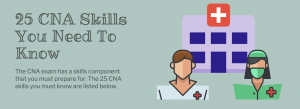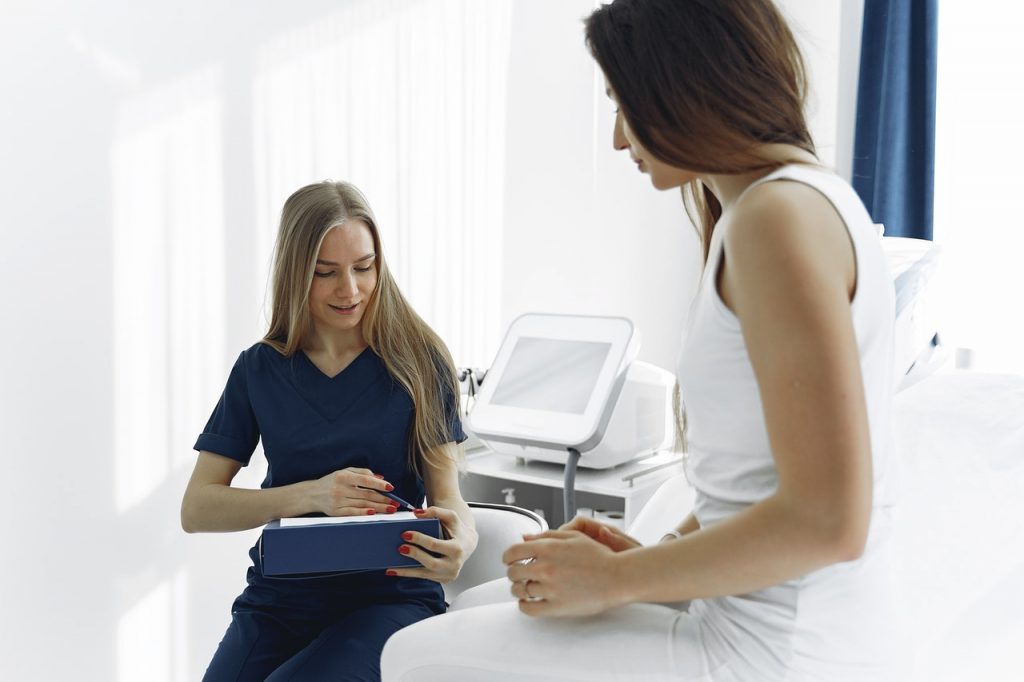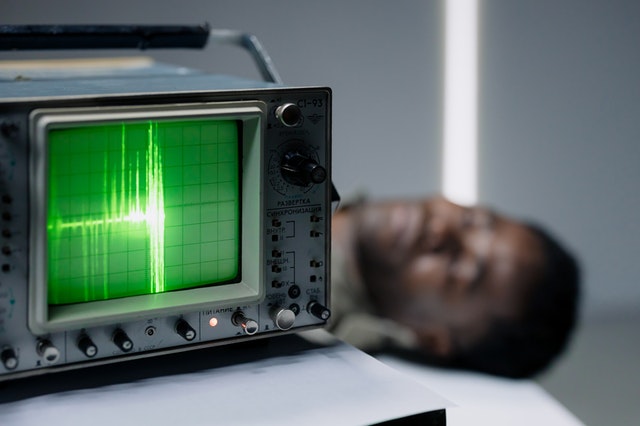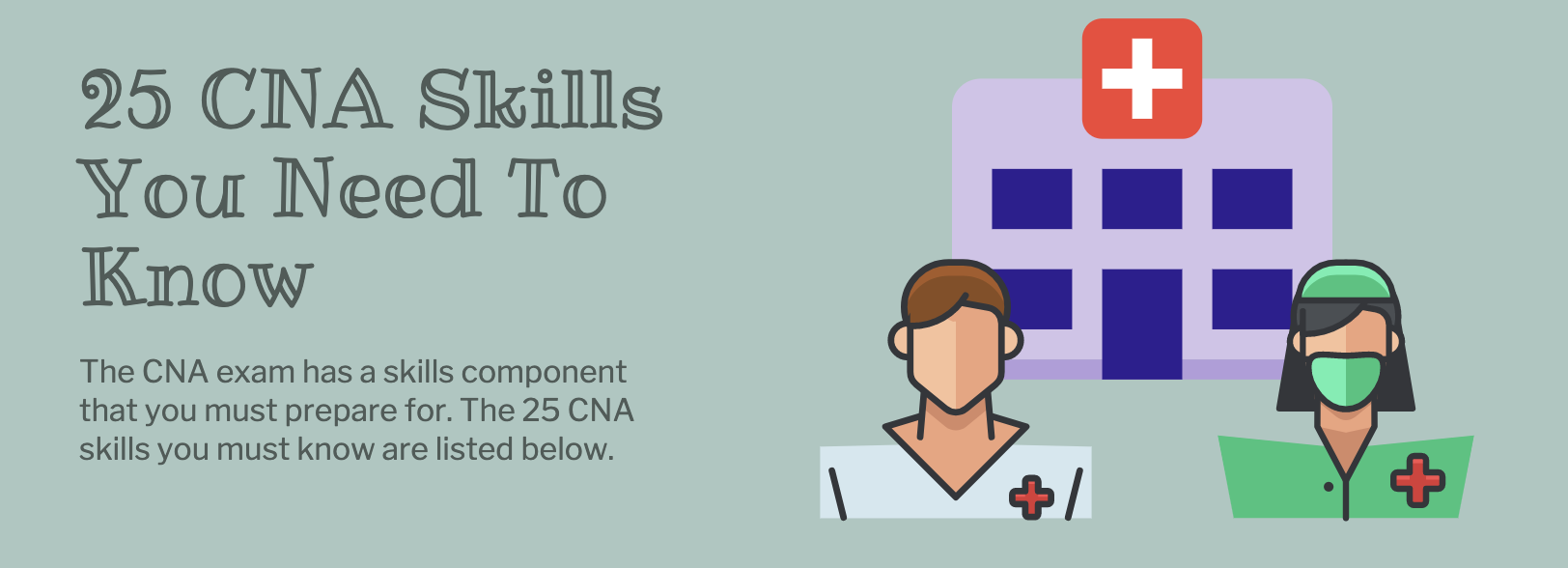If you’re thinking about becoming a certified nursing assistant (CNA), you might be wondering what CNA skills you’ll need to be successful.
As a Certified Nursing Assistant (CNA), there are skills that you need to know. The CNA exam has a skills component that you must prepare for. The 25 CNA skills you must know are listed below, along with a brief overview of each skill. So, what are the 25 skills for CNA? Let’s find out together!

25 Must-have CNA Skills for Nurse
1. Handwashing
In the CNA skills examination, some skills are selected randomly but handwashing is considered as a separate skill that is done along with other skills. It is important to master this skill because you’ll almost certainly be asked to wash your hands before, during, and after other skills.
Maybe you need Helpful Tips for Dealing with Dry Hands
2. Putting and removing gown and gloves
It is critical to properly put on and remove Personal Protective Equipment (PPE), such as gowns and gloves, particularly now that we are in a pandemic. During a CNA skill test, it is one of the most often asked skills.
3. Positioning in a Fowler’s position
Fowler’s position is done for patients that have trouble breathing. This relaxes the abdominal muscles and allows the chest to expand. The head of the bed is raised between 30 degrees (semi-Fowler’s) and 90 degrees (high-Fowler’s) based on the patient’s preference.
4. Positioning in a lateral (Side-Lying) position
A patient is placed on their side to prepare their bed or adjust their clothes in a lateral position. It is also done for patients who are unable to move to prevent bedsores.
5. Transferring from bed to chair using a gait belt
Transferring from bed to wheelchair necessitates the use of a gait belt. This is accomplished by securing a gait belt around the patient’s waist and telling them to stand for you to pivot to the chair.
6. Assisting in walking using a gait belt
Similarly, you might also be asked to walk a patient using a gait belt. This requires the CNA to encourage the patient to walk. An upward tension should be maintained while guiding the patient.
7. CNA Skills – making an occupied bed
When a patient is lying down, CNAs can be asked to make their bed. This can be accomplished by repositioning the patient to the side and replacing the linens with new ones.

8. Perform passive range of motion in the upper body
This helps the patients in the mobilization of their upper body which covers the fingers, wrists, elbows, and shoulders. Appropriate patterns for each joint should be followed which include flexion, extension, abduction, adduction, and rotation.
9. Perform passive range of motion on the lower body
This will help patients to mobilize their lower body which covers the toes, ankles, knees, and hips. The same procedure with the upper body is followed while ensuring that the patient is not in discomfort.
10. Brushing the dentures
This is the tenth in 25 CNA skills. This is needed for patients who wear dentures. It should be kept in a denture cup to prevent it from being misplaced. It should be brushed using warm water and a denture cleaner. Also, make sure that the gum areas are properly cleaned.
11. Mouth care for an unconscious patient
Patients who are unconscious need oral hygiene to keep their teeth and mouth clean. To avoid aspirating any fluids, the patient should be laid on their side or raised not more than 30 degrees.
12. Giving a partial bed bath (Upper Body)
An upper body bed bath may be needed for immobile or unconscious patients. To clean the patient’s face and the rest of the upper body, clean washcloths and a basin of warm water are needed.
13. Giving a partial bed bath (Lower Body)
A partial lower body bed bath can also be requested for CNAs. Start bathing with the hips and work your way down the lower body, making sure the patient is comfortable.
14. Giving a back rub/Massage
Following a bath, a back massage, or a back rub may be beneficial in reducing the physical discomfort that the patient may be experiencing.
15. Giving perineal care to a female patient
Perineal care is very important to female patients to prevent infections such as Urinary Tract Infection (UTI). Assist the patient into the optimal position, which is the frog-leg position, while ensuring that privacy is maintained.
16. Shaving
Male patients who are unconscious or immobile can need assistance shaving their faces. Shaving cream may be used if available and an electric razor should be used to prevent nicks and cuts.
17. Cleaning and trimming fingernails
Patients who are admitted to the hospital may need assistance with fingernail trimming. They could inadvertently scratch themselves if it gets too long. Trim the nails and smooth the edges with a nail file if desired.
18. Serving the meal tray and feeding paralyzed patients
Patients that are paralyzed need assistance in eating and drinking. Ensure that the patient receives the correct meal tray and starts feeding the patient slowly, giving them time to chew their food and offer a sip of drink every bite.
19. Assist in dressing with a paralyzed/immobile arm
Patients with arm or shoulder injuries have trouble changing their clothes. As a CNA, you may be asked to assist the patient. It is easy when you start undressing on the mobile side of the body.
20. Assisting with bedpans
CNAs could be asked to help with bedpans for immobile or bedridden patients. Assist the patient in rolling onto their side and guiding them onto the bedpan ensuring that their buttocks are in the center.
21. Measuring and recording the height
The patient’s height will be taken upon consultation or admission to the hospital. This measurement is important as it will be paired with the weight to determine the Body Mass Index (BMI).
22. Measuring and recording the weight
The patient’s weight is important to keep track of because it determines the correct drug dose as well as the body fluid status. To maintain accuracy, make sure the scale is set to “0” before the patient steps onto the scale.
23. Counting and recording respirations
When taking the patient’s respirations, don’t tell them you’re counting their breaths. This can make the patient more aware, causing their usual breathing rhythm to change. Count the number of the patient’s respiration in a minute and record it.
24. Counting and recording radial pulse
When taking the pulse, find the radial artery on the underside of the wrist at the thumb side. You should use your fingertips and count the number of the patient’s pulses in one minute.
25. Taking and recording blood pressure
This skill is the last one in 25 CNA skills. A blood pressure cuff and stethoscope are used to take a patient’s blood pressure. Be sure the patient’s arm is at the same height as their heart and in a stable position and place the stethoscope on the brachial artery on the arm.
Other CNA Abilities
Taking care of patients is a very serious job that requires specialized skills. Some skills will not be tested in the CNA skills exam but are equally important for the job. In addition to the above 21 CNA skills, other skills you will need to learn to become a nursing assistant include:
-
Attention to details
-
Time management
-
Physical coordination
-
Knowledge of the legal rights of patients
-
Documentation and record-keeping
-
Basic data entry including EHR
-
Reporting details
-
Capability to adapt to medical equipment and technological advancements
-
Training new staff
-
Organization skills
How to Boost Your CNA Skills?
Passing both the written and practical examinations offered by various states is required to become a certified nursing assistant. Trying to identify and improve your skill set in specific nursing assistant tasks will aid in the development of your job qualifications. Here are some tips to help you improve your CNA skills:
Study utilizing online resources
Online tutorials are readily available to provide you with step-by-step instructions on performing specific CNA skills. The only disadvantage of using online resources is that it may be difficult to have actual practice on skills you want to improve, especially since learning through online resources requires independent study. Choosing an accredited online institution will assist you in obtaining the qualifications required to continue with in-person training.
Understand your state’s CNA skill requirements
To improve your CNA skills, you must first understand your own abilities and determine which areas require improvement. Identifying your strengths and weaknesses, followed by creating a checklist, can assist you in developing strategies to overcome your shortcomings. It’s also critical to understand the specific skill requirements for passing the certification in your state.
Enroll in training programs
Enlisting training centers to practice with instructors who can instruct you on how to perform effective nursing assistant tasks is one of the most effective ways to improve CNA skills. Along with their lectures, training centers offer activities that simulate real-world healthcare scenarios.
Choose state-approved CNA training centers whose curriculum has been approved by state authorities that regulate professional nursing assistants. Many training centers also offer CNA skills examination review courses, which cover the majority, if not all, of the skills which will be tested in the certification. This increases your chances of passing the CNA skills exam.
Gain Real-World Experience
Getting hands-on experience in the healthcare field is the best way to improve your CNA skills. It is strongly advised to apply for internships in healthcare facilities, which typically require a state-approved Nursing Assistant Training certification from accredited institutions. In most cases, internships offer training in the field and assist you in developing a specific skill set until you are ready to perform nursing assistant tasks independently.
While the CNA test can be overwhelming, you can pass it as long as you give it your all and study the CNA skills you need to know. Along with the skill test, you can take our free CNA practice test 2024 to get ready for your CNA written exam. Thousands of free CNA practice questions and our unique gamified learning technique will help you easily pass your exam.
>>> Read more: Point Of Care CNA

Top Registered Nurse Interview Tips
Remember some important registered nurse interview tips in our post is an excellent way to ensure that you are well-prepared for the interview.
January 1, 2022

Everything That You Should Know About The CNA Online Test
Lots of students have wondered about the CNA online test as well as what should be remembered when taking it. Let’s get started!
January 1, 2022

All You Need To Know About Checking The Apical Pulse
What is the apical pulse which is the method to check it? Here we will help you with the following beneficial information. Let’s get started!
January 1, 2022

